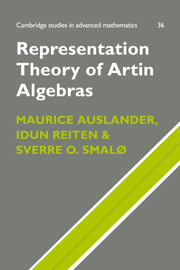Book contents
- Frontmatter
- Contents
- Introduction
- I Artin rings
- II Artin algebras
- III Examples of algebras and modules
- IV The transpose and the dual
- V Almost split sequences
- VI Finite representation type
- VII The Auslander–Reiten-quiver
- VIII Hereditary algebras
- IX Short chains and cycles
- X Stable equivalence
- XI Modules determining morphisms
- Notation
- Conjectures
- Open problems
- Bibliography
- Relevant conference proceedings
- Index
IX - Short chains and cycles
Published online by Cambridge University Press: 11 May 2010
- Frontmatter
- Contents
- Introduction
- I Artin rings
- II Artin algebras
- III Examples of algebras and modules
- IV The transpose and the dual
- V Almost split sequences
- VI Finite representation type
- VII The Auslander–Reiten-quiver
- VIII Hereditary algebras
- IX Short chains and cycles
- X Stable equivalence
- XI Modules determining morphisms
- Notation
- Conjectures
- Open problems
- Bibliography
- Relevant conference proceedings
- Index
Summary
One of the main problems in the representation theory of an artin algebra Λ is determining when two modules M and N in mod Λ are isomorphic. Λ completely general answer to this problem was given in Chapter VI in terms of R-lengths of the R-module of morphisms from each indecomposable module to the given module M. At first sight it seems hopeless to ever use this criterion for proving that two modules are isomorphic. Our use of it in this chapter shows that this is not entirely true. Nonetheless, it is obvious that it is desirable to have other criteria which are more manageable, even if they are not as general.
In this chapter we concentrate on giving conditions on a pair of indecomposable Λ-modules which guarantee that they are isomorphic in terms of such familiar invariants as their composition factors, their projective presentations or their tops and socles. The basic assumption is that one or both of the modules do not lie on certain types of cycles of morphisms in mod Λ, namely short cycles. We start the chapter by discussing these types of modules.
Short cycles
In this section we introduce and study the notions of short cycles and short chains.
- Type
- Chapter
- Information
- Representation Theory of Artin Algebras , pp. 313 - 334Publisher: Cambridge University PressPrint publication year: 1995

